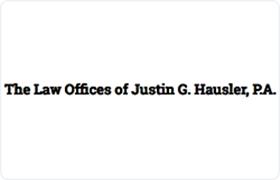Sorrento Juvenile Law Lawyer, Florida
Sponsored Law Firm
-
 x
x

Click For More Info:
-
The Law Offices of Justin G. Hausler, P.A.
5570 South US Highway 17-92 Casselberry, FL 32707» view mapCriminal Defense Because Your Case Matters
As a Former Prosecutor, Justin G. Hausler has a wealth of jury trial experience and offers representation regarding all misdemeanor and felony charges.
407-617-1064
Richard M. Adams
Domestic Violence & Neglect, Juvenile Law, White Collar Crime, Slip & Fall Accident
Status: In Good Standing
Cheryl Denise Knight-simpson
Elder Law, Family Law, Juvenile Law, Clean Air Practice
Status: Inactive Licensed: 12 Years
Kenneth Cornelius Gallagher
Juvenile Law, Divorce, Credit & Debt, Personal Injury, Criminal
Status: In Good Standing Licensed: 24 Years
 Justin Hausler Casselberry, FL
Justin Hausler Casselberry, FL AboutThe Law Offices of Justin G. Hausler, P.A.
AboutThe Law Offices of Justin G. Hausler, P.A. Practice AreasExpertise
Practice AreasExpertise
